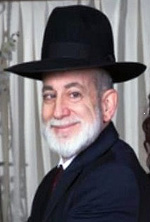Terumah – Enjoying to Eat or Eating to Enjoy
By Rabbi Yaakov Marks

SAN DIEGO — Terumah is the first of the tithes that are taken by a farmer from his crops that are grown in Israel. The farmer separates from his produce a portion between one-sixtieth and one-fortieth and gives it to a Kohen (priest). Terumah is treated as sacred food in that it must not be eaten when the priest is in a state of ritual impurity or when the Terumah itself is ritually impure. It may not be eaten by a non-Kohen. “But no non-Cohen may eat of it. If a man will eat of the Terumah accidentally he must add one-fifth and repay the Terumah to a Cohen.” (Leviticus 22:14)
The Talmud (Yoma 80b) makes an observation regarding the wording of this phrase. “If a man will eat. “Only if the man eats the Terumah does he get fined the one-fifth, however, if he damages it he only pays the principle. The Talmud continues and says if a person eats the Terumah when over eating he doesn’t pay the fine because he didn’t eat, but he damaged. Rashi commented on this that he damaged the food and he damaged himself.
What difference does it make if he ate the Terumah when he was hungry or full? Didn’t he physically eat the Terumah? Why does the Talmud say that he damaged the food?
Many positive and negative commandments revolve around eating or refraining from eating. From the Talmud’s interpretation of the Torah, the Rabbis learn about hod G-d’s desires a person to use food. G-d could have created a man without the ability to taste and food without color or flavor. Because of His overwhelming love for man G-d created man with the ability to experience a wide spectrum of flavors and sensations and foods with an almost endless array of flavors, aromas, and colors. G-d wanted man to enjoy himself while he was eating to refuel his body, however, along with this wonderful gift came the potential to misuse it and overindulge in the pleasure of eating.
Food was created to nourish the physical body. G-d wanted us to be dependent on Him for our food so we would maintain a level a humility and not become arrogant from complete self-independence. In order to show He was doing this with love and for our benefit, G-d created the tremendous pleasure of food. Unfortunately, along with this blessing came the potential to misuse this pleasure and over indulge and eat just in the pursuit of pleasure and without any regard for nourishing our body properly. The Talmud tells us that when a person eats more food than his body requires for nourishment he is wasting that extra food and causing damage to his body.
When a person is eating to perform a Mitzvah he needs to be careful. When eating properly at a Shabbat table a person gets merit for “Oneg Shabbat” having the pleasure of Shabbat by eating and enjoying oneself on the Shabbat. The Talmud tells us that if the person over eats, he is no longer getting a merit for his eating, but is now considered to be damaging himself and the food.
May we be blessed to have the wisdom and strength to have our eating pleasurable, meaningful, and beneficial. May we merit that our eating is always for our merit and not for our detriment.
*
Rabbi Marks is a life and health coach, who may be contacted via ahealthyrabbi@gmail.com. Comments intended for publication in the space below must be accompanied by the letter-writer’s first and last name and his/her city and state of residence (city and country if outside the U.S.)